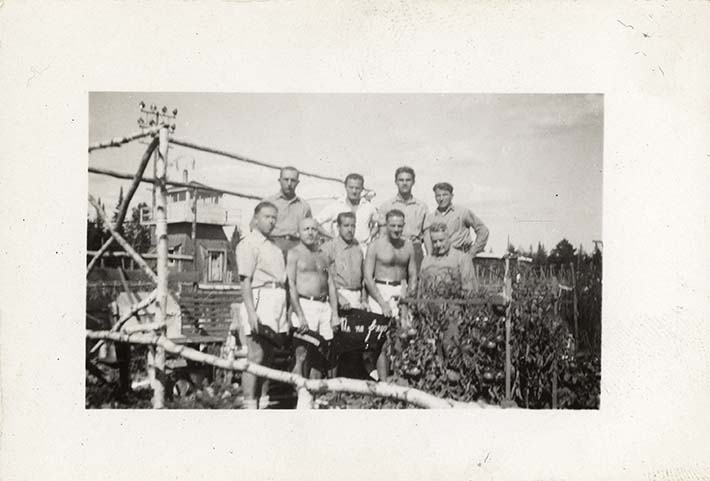Photograph of internees in vegetable garden with fascist banner - en anglais seulement
Nine internees standing in the camp vegetable garden. Clothing suggests a summer timeframe as do the tomatoes hanging from the vines visible in the foreground. Camp guard tower is visible in left background. Given the informal setting, it is unlikely the picture was officially authorized. The photograph is also out of focus. This image was likely taken at the same time as DICEA2011.0001.0012, DICEA2011.0001.0022, DICEA2011.0001.0028, DICEA2011.0001.0029 and DICEA2011.0001.0031.
The location of the photograph is not conclusively known. However, given other photographs (see DICEA2011.0001.0001) it is likely that the picture was taken in Fredericton Internment Camp in 1943.
Internees were treated well by Internment Operations. The men note that they were fed three meals a day. However, internees also note that on first arrival camp food was intolerable. It was only when the Italian Canadian internees took over the camp kitchen, including the use of food grown in their own vegetable gardens, that the diet became appetizing. Breakfast included coffee, milk, oatmeal, bacon, fruit juice and eggs. Lunch could feature soup, meat and vegetables, and omelettes. Dinners alternated between meat or fish, with vegetables and pasta. Depending on the season, internees also received apples or a salad. Bread was included with all meals. They were also allowed parcels from home which often included Italian foodstuffs, including olive oil and fruit.
The men are holding a banner which reads "Me ne frego", which translates to "I don't give a damn". The motto is linked to Italian fascism, used by supporters of Mussolini. Earlier articles on the subject used such symbols and other activity to imply fascist support by Italian Canadian internees. A recent review by anthropologist Sam Migliore in Beyond Barbed Wires: Essays on the Internment of Italian Canadians, notes the need to consider multiple-meanings when analyzing symbols. As he notes, "symbols of any kind are human constructions that have no meaning in-and-of themselves". While wearing the berets may in fact suggest facist sympathy and support, it may also reflect group belonging and identity, or resentment for the internment experience. In fact, "Me ne frego" and versions thereof are still used (although considered vulgar phrases). This modern usage is not linked to fascism or implied political affliliations.
This photograph belongs to a collection preserved by Italian Canadian internee Osvaldo Giacomelli. Previous to his death, he had spoken on the record about his internment to journalists and academics. Some suggestion has been made that Giacomelli was a fascist supporter and Mussolini-adherent. He was one of the longest-serving of the Italian Canadian internees, released on May 29, 1945. Giacomelli himself felt that he was wrongfully interned, and sued the Government of Canada in 2005. When Giacomelli died in March of 2006, his case was still unresolved.
NOTE: there is a duplicate print in the collection (DICEA2011.0001.0025).















